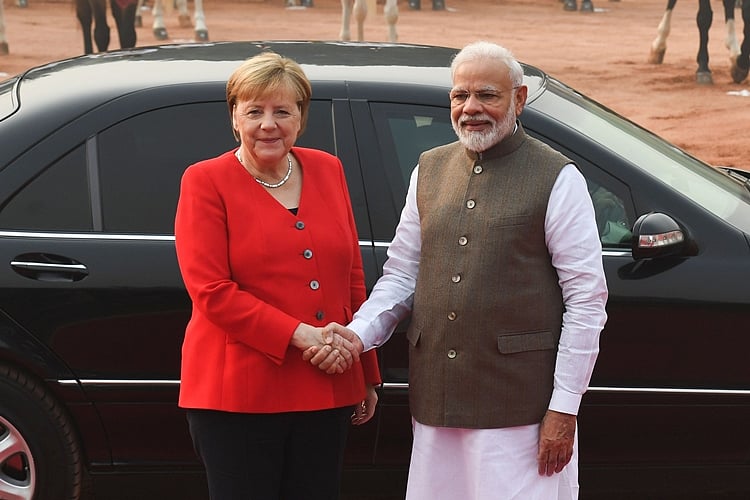There was an air of candidness in discussions between Prime Minister Narendra Modi and German Chancellor Angela Merkel in New Delhi on Friday with the two leaders agreeing that “cross border movement of terrorists” for which Pakistan is the fountainhead must be ended, and Merkel affirming that the situation on the ground for people of Kashmir as of now was not good for the long-term and that it needed to change.
Evidently, while the first message was for the Pakistan government to put a stop to cross border terrorism directed at India, the second was for the Modi government to bring about normalcy in troubled Kashmir quickly because the present situation could not be sustained indefinitely.
In an indirect message to Pakistan, the two sides asked it to root out terror havens and to prevent its territory from being used for cross border attacks.
In the same candid vein, Angela Merkel told a meeting of the Indo-German Chamber of Commerce that German firms were facing hurdles in India’s bureaucratic labyrinth while in the same breath acknowledging that Indian firms were facing similar hurdles in Europe with their bureaucracy and that efforts were on to see that the problem is tackled with the new European commission.
The joint statement issued after official talks between India and Germany envisaged deeper cooperation between the defence industries of the two countries to take advantage of defence corridors set up in the states of Tamil Nadu and Uttar Pradesh under the Make in India initiative. The need was felt too for the two countries to establish regular dialogue between their defence ministers alternatively in India and in Germany at least once every two years.
The joint statement said Germany would work towards facilitating “export of military equipment as well as technology sharing” with India. The underlying message at the biennial Indo-German meeting was of stepping up strategic cooperation between the two countries. The two sides signed 22 pacts covering sectors spanning from artificial intelligence to energy and the economy.
To meet India’s anxiety over escalating terrorism the two nations resolved to intensify bilateral and multilateral cooperation to deal with terrorism and extremism. The two leaders underlined the need to finalise and adopt the Comprehensive Convention on International Terrorism in March 2020.
There was agreement to give momentum to revival of stalled negotiations for free trade agreement with the European Union.
With an improved environment for sorting out issues, there was hope that the free trade agreement would see a revival for mutual benefit. It was differences over tariffs and market access that had led to the impasse in 2013. All in all, the parleys were productive and frank.

.jpg)



